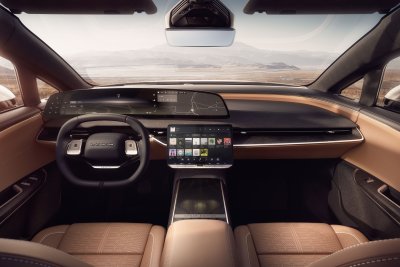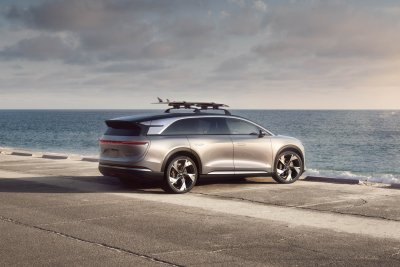Startup battery-electric vehicle (BEV) manufacturers have broken through, becoming known and selling thousands of models per year. Now they are in a struggle for their lives, aiming to remain relevant as part of the car buying conversation while they aim for profitability.
Rivian and Lucid have been able to do what Canoo, Faraday Future and Fisker have not. They have debuted electric vehicles (EVs), sold them for a few years, and are now in the conversation of "what's next" with passionate brand enthusiasts and the greater public.
Read more: Earn Cash Back at EV Charging Stations
Both companies have shown what is coming in the product pipeline; Lucid with its Gravity sport utility vehicle (SUV) and Rivian with the R2 and R3 SUVs.
The Lucid Gravity, which will be available in two- or three-row configurations, is expected to go on sale by the end of the year.
Rivian's R2 and R3 are further out. While the R2 can be reserved now for a $100 deposit, deliveries are not expected to begin until early 2026. R3 will come after R2.



"Startups like Rivian and Lucid have achieved initial success in the budding U.S. EV market with their innovative products, benefiting from being new and exciting brands. However, they cannot afford to become complacent. As the novelty of their debut products fades, they face fierce competition from established automakers, quickly releasing a massive influx of new EVs," Paul Waatti, director of industry analysis at AutoPacific told Newsweek.
Until the Gravity, R2 and R3 make their way to North America's driveways, Lucid and Rivian are tasked with continuing to produce the product they already offer and keep it fresh. Those sales will pave the way for promised new product to be a reality.
Lucid making its cars better and more affordable
Lucid is honing the variants of its Air sedan and lowering prices. The cost of the entry level Air Pure is down nearly $10,000 from where it started. The top-of-the-line Air Sapphire performance model is a costly $249,000. Midgrade Touring and Grand Touring models are priced to start at $77,900 and $109,000 respectively.
Air Grand Touring has been made better for 2024. It can now go an Environmental Protection Agency-rated 516 miles between charges, the longest range of any electric vehicle (EV) in the U.S. market today.


That range estimate has been made more reliable in cold weather thanks to the addition of a heat pump, the same as what is in the Air Sapphire.
Engineers have also made the 819-horspeower car more efficient with changes to battery cell chemistry and motor design. Those changes have impacted the way the car charges, with DC fast charging capability improved by 15 to 30 percent.
Automatic battery preconditioning now occurs when the car is en route to a charging station as located by the navigation system. This allows for faster charging upon plug in.
In February, the automaker announced that every Air owner would now receive two years of complementary scheduled maintenance with purchase, and a $1,000 charging allowance toward the Lucid charging accessory of the customer's choosing.


Rivian leans in on over-the-air updates
Rivian is already off to a banner year of accolades for its models. The R1T pickup truck earned the highest satisfaction ranking of any vehicle in 2023 J.D. Power U.S. Electric Vehicle Experience Ownership Study, the company announced in February.
Its R1S three-row SUV is now rated as an Insurance Institute for Highway Safety Top Pick+, the highest rating that can be earned.
In June, the company signed an agreement with Tesla to give Rivian vehicle owners access to the Tesla Supercharger network. An adapter will be made available this spring for owners and North American Charging Standard charge ports will come standard on future R1 models starting in 2025.
Rivian is also adding technology features to its model lineup, the R1T truck and R1S three-row SUV, via over-the-air (OTA) updates. An industry-first feature, EV charging station scoring, is now available.


This update allows drivers to see how reliable a charger is based on real world data that has been gleaned from Rivian vehicles. It also uses data from connected fleet vehicles to route drivers to the most reliable fast charging locations rather than just the closest when charging is required on a route as detailed by the on-board navigation system.
The information is also viewable on the Rivian app.
"To maintain their market presence, these startups face a series of challenges beyond their initial product launches. They must find manufacturing efficiencies, tackle profitability challenges, and sustain steadfast marketing for their current models. Also critical to their success is generating excitement for their upcoming products to continue to capture consumer interest. The road ahead is long and winding, and the real test of their long-term success is just beginning, but what we've seen so far from Rivian and Lucid suggests these brands are here for the long haul," Waatti said.
Uncommon Knowledge
Newsweek is committed to challenging conventional wisdom and finding connections in the search for common ground.
Newsweek is committed to challenging conventional wisdom and finding connections in the search for common ground.
About the writer
Eileen Falkenberg-Hull leads the Autos team at Newsweek. She has written extensively about the auto industry for U.S. News & ... Read more
To read how Newsweek uses AI as a newsroom tool, Click here.





